Michigan Democrats reflect on legislative session after decades without full control
In January, abortion rights groups celebrated the introduction of legislation to repeal Michigan's 1931 abortion ban after Democrats flipped control of both chambers of the state Legislature for the first time in 40 years. But by the end of the session, those same groups bemoaned the abortion restrictions left untouched when lawmakers headed home for the rest of the year.Those restrictions include a law mandating a 24-hour waiting period for those seeking abortions and a ban on Medicaid-funded abortions. A single Democratic lawmaker's opposition derailed efforts to repeal them, exposing the limitations of a single-vote majority in both legislative chambers and an apparent disconnect between the issues that helped Democrats win legislative majorities and what they delivered.Proposal 3 passed with a larger share of support from voters than any of the Democratic candidates running for top statewide offices. Abortion rights proponents consistently posit the measure helped deliver Democrati

In January, abortion rights groups celebrated the introduction of legislation to repeal Michigan's 1931 abortion ban after Democrats flipped control of both chambers of the state Legislature for the first time in 40 years. But by the end of the session, those same groups bemoaned the abortion restrictions left untouched when lawmakers headed home for the rest of the year.
Those restrictions include a law mandating a 24-hour waiting period for those seeking abortions and a ban on Medicaid-funded abortions. A single Democratic lawmaker's opposition derailed efforts to repeal them, exposing the limitations of a single-vote majority in both legislative chambers and an apparent disconnect between the issues that helped Democrats win legislative majorities and what they delivered.
Proposal 3 passed with a larger share of support from voters than any of the Democratic candidates running for top statewide offices. Abortion rights proponents consistently posit the measure helped deliver Democratic legislative majorities. It received more votes than the total cast for Democratic candidates for the state House or state Senate.


"I think we believe the reason why we have the Legislature that we do right now is because abortion was on the ballot," said Merissa Kovach, the legislative director for the American Civil Liberties Union of Michigan. While Gov. Gretchen Whitmer was unable to eliminate all of the abortion restrictions she wanted, she signed legislation Tuesday repealing other laws such as a requirement for a separate insurance policy to pay for abortions.
Some anticipated Democrats' slim control would hinder Democrats' productivity this year or stall change long-awaited by advocates. Democrats defied some of those predictions at the outset. After taking power, they largely stuck together to act swiftly at the start of the year to move legislative priorities from labor laws to gun safety measures that languished under GOP control. But when lawmakers returned from their summer break, fissures emerged within the Democratic caucus, particularly in the state House where more than half are freshmen lawmakers. Some voiced frustrations about the items on their agendas that stalled.
Will a Democratic majority last?
Reflecting on the first session in which Democrats held full control of the Legislature for the first time since 1983, Democratic legislative leaders took a victory lap.
"Nobody's ever perfect," said Senate Majority Leader Winnie Brinks, D-Grand Rapids. "But I think we did a really excellent job finding the ways that we can work together, and I think the proof is in the bills we passed on major issues."
House Speaker Joe Tate, D-Detroit, delivered his own message to those who wanted more from the first year of Democratic control of the Legislature in 40 years. "The work that we've done up to this point bodes well for what we can do in the future," he said.
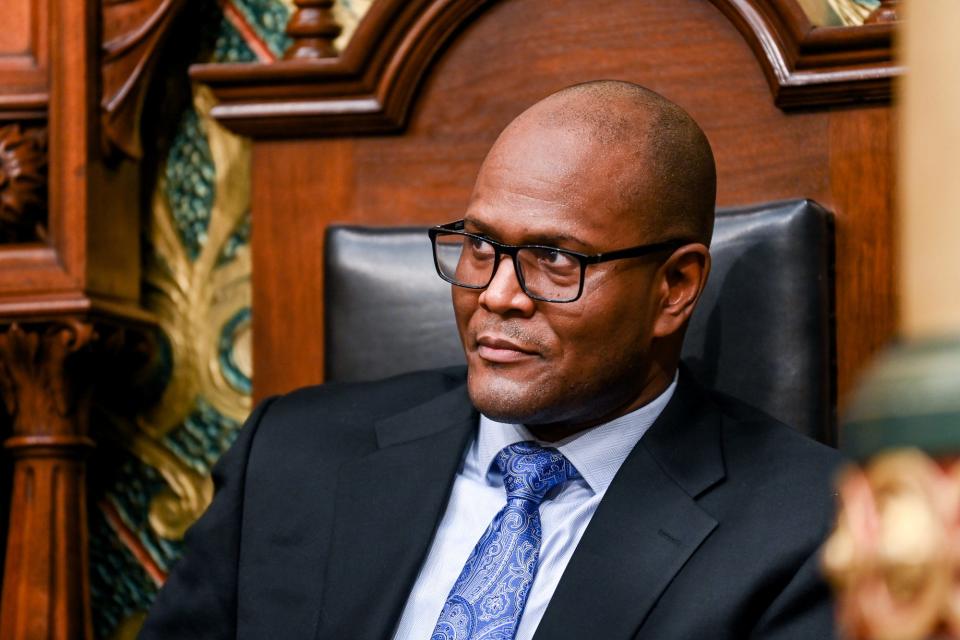

The last time Democrats had a majority in Lansing was in 2010 in the state House. MoReno Taylor II, executive director of Fund MI Future, was a legislative staffer at the time and said Democrats lost their power because they were too afraid to be progressive. He could envision history repeating itself as Democrats stare down elections next year in the state House. "You have a whole new crop of legislators who campaigned on doing progressive things for the people in their community," he said. But when they arrived in Lansing, they were stymied, he said.
A freshman Democratic lawmaker who won his election last fall in one of the many newly drawn swing districts his party needs to hold onto to keep their majority delivered a mixed assessment of Democrats' legislative performance.
"I think the first half of the year we really delivered," said state Rep. Joey Andrews, D-St. Joseph. But he expressed disappointment with how Democrats handled the second half of the year. He sees "opportunities left on the table," including a bill he sponsored that never made its way to the floor to repeal a Michigan law that bars local governments from putting in place more generous minimum wage and paid leave policies than those at the state level. Moving forward, he wants to see more ambitious Democratic policymaking he says goes "hard on our values."
"Because majority could be fleeting," he said.
It's already gone in the state House, at least temporarily. A pair of former state representatives — both Democrats — recently won mayoral elections in metro Detroit. While they'll still control both chambers of the Legislature next year, the vacancies leave Democrats without a majority of votes in the state House. The even partisan split in the chamber will slow down any legislative priorities that encounter united GOP opposition.
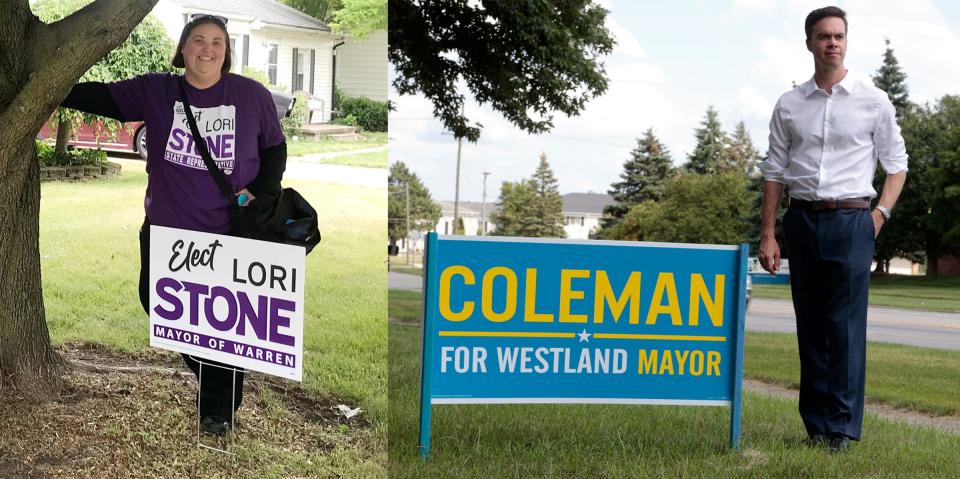

For their part, GOP legislative leaders delivered a sharp critique of Democrats' actions during the legislative session that just ended. Senate Minority Leader Aric Nesbitt, R-Porter Township, blasted several moves by Democrats, including energy policies he called "extreme", votes to "give millions in handouts to multinational corporations" and legislation that strikes a requirement to hold back third graders who fail a reading proficiency test, saying Democrats "gutted reading standards." Nesbitt said in a statement, "it's quite clear Democrats failed their math, science, and history lessons" and gave Democrats an "F" for the term.
House Minority Leader Matt Hall, R-Richland Township, similarly criticized the Democrats’ agenda, calling their budget "wasteful," their labor agenda a "payback" for their "union boss supporters" and their energy policies "radical."
"But one-party rule didn't last long," Hall said in a statement. "The House now has a bipartisan balance, and Democrats should turn the page and work with Republicans to finally solve all of the problems they've ignored for a year, like fixing our local roads and bridges, making our schools and communities safer, and attracting high-paying careers and new residents to our state."
The last time the state House was evenly divided along partisan lines was in 1994. But just a year ago Democratic leaders found themselves on opposite sides of the state celebrating a different historic milestone.
A long to-do list
In November 2022, Brinks joined Democrats in Kent County when she learned their party won full control of the Legislature while Tate watched the election results at the Motor City Casino in Detroit. Coming together in Lansing, the pair shepherded Democratic priorities through the legislative process to Whitmer.
A Whitmer spokesperson celebrated what they accomplished.
"With Governor Whitmer’s leadership and a new Democratic majority, this legislative term has been one of the most productive in state history," said Whitmer press secretary Stacey LaRouche, who provided a list of legislative actions that included new tax, labor and gun policies. She said Whitmer "looks forward to continuing this momentum in the next legislative session to deliver on these kitchen table issues for Michiganders."
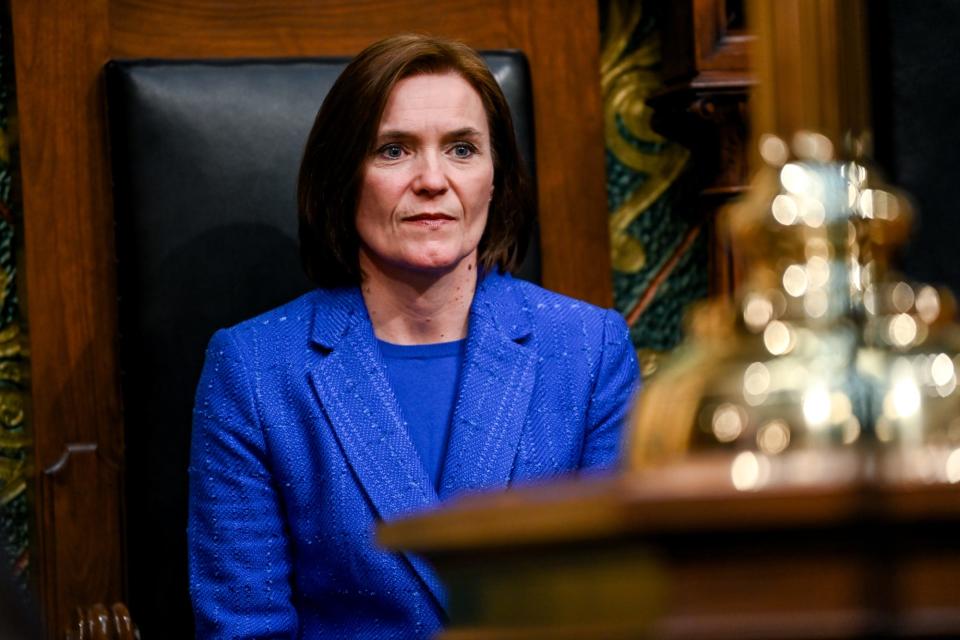

Within the first six months, Democrats passed a major tax overhaul with a $1 billion tax cut for retirees and working families. They expanded the state's civil rights law to add explicit protections from discrimination for LGBTQ+ individuals. They repealed Michigan's right-to-work law. Michigan AFL-CIO communications director Aaron Pelo called the right-to-work repeal "history-making stuff." With it, Michigan became the first state in nearly 60 years to ditch the law that allows those in unionized workplaces to opt out of paying union fees and dues.
Democrats also reinstated a prevailing wage requirement for state-funded construction projects. They passed new laws aimed at curbing gun violence and crafted a state budget that includes funding for free breakfast and lunch for all public school students, infrastructure projects like replacing water lines and temporarily expanding a tuition-free path to higher education.
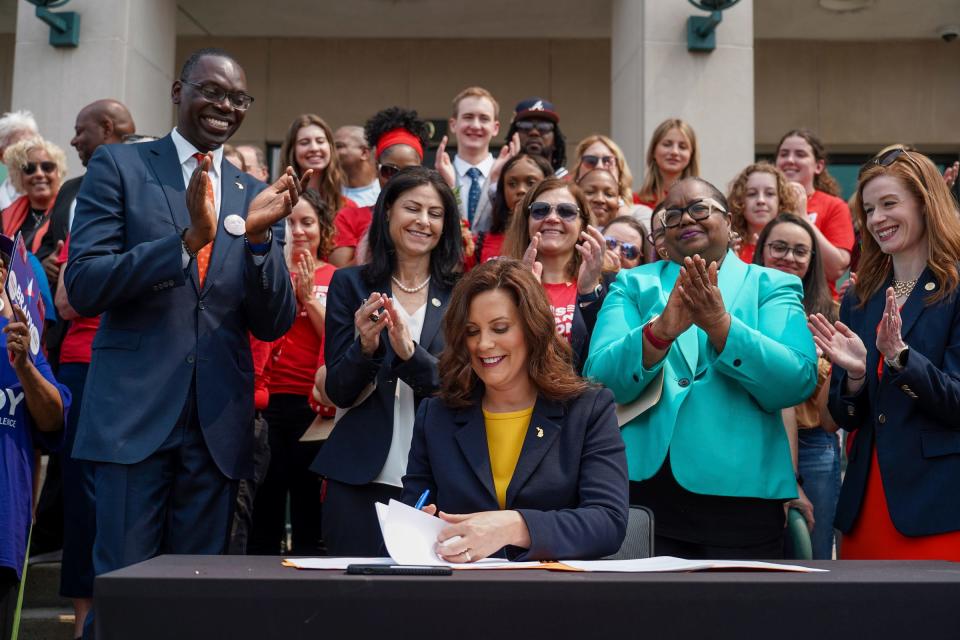

"We have moved major pieces of legislation faster than any Legislature in decades," said state Sen. Kristen McDonald Rivet, D-Bay City.
Despite the swift movement on some Democratic priorities, lawmakers ended the session with some big items left undone.
McDonald Rivet said she was "really frustrated" to see a proposal to create a prescription drug affordability board not make its way to Whitmer before the end of session. She said she also wanted to see the House tackle auto insurance after the Senate voted on legislation to increase reimbursement rates for medical providers treating car crash victims in Michigan. People are suffering because of inaction on those fronts and she has experienced a "flooding" of visitors coming to her office specifically to talk about those two issues, she said.
Other groups have similarly lined the halls of the Capitol to lobby for their own priorities.
One staged a sit-in at Brinks' office to demand swift passage of bills to enable undocumented immigrants to obtain driver's licenses. Organizer Gema Lowe with the Michigan chapter of Movimiento Cosecha has fought for the legislation for years and hoped that Michigan's Democratic trifecta would follow Minnesota's footsteps with the expansion of driver's licenses to undocumented immigrants. Legislative committees have not held hearings on the Michigan bills sponsored by most Democratic lawmakers. According to the group's legislative director Joe Gutowski, the legislation also has the support of the majority of the Michigan Democratic Party Rural Caucus and is of particular interest to farmers.


Even Whitmer who crossed off many items on her own legislative agenda this year didn't see everything she asked for land on her desk. This fall, lawmakers passed legislation to establish a 100% clean energy standard and codify health care protections in the federal Affordable Care Act in state law — two items Whitmer asked for in a speech before the end of the Legislature's summer recess. But they didn't heed her calls for other policies, including the proposal for a drug affordability board and another for paid family and medical leave.
Asked whether she wants lawmakers to start with those proposals when they reconvene next year, Whitmer said she's talking with Democratic legislative leaders and "keeping a line of open communication" with GOP leaders. "I think we've got to stake out an agenda where we can find common ground. I'm hoping that perhaps those are places where we can. But we're going to take on a lot of things as we go into 2024," she told reporters after an event when she signed legislation repealing several abortion restrictions.
Frustrations with financial transparency, economic development
While Democratic lawmakers map out their legislative priorities for the new year, some expressed dismay with what they see as missed opportunities on the items they already tackled.
Under Proposal 1 — a constitutional amendment approved by voters — lawmakers had until the end of the year to implement disclosure requirements for reporting information about their own finances. Transparency advocates wanted the legislation to create financial disclosures in Michigan to go further than what lawmakers passed.
"There's an immense amount of work yet to be done on implementing real transparency, anti-corruption and ethics reforms," said state Rep. Betsy Coffia, D-Traverse City, in a text message. "Look, Lansing clearly has very bad deeply ingrained habits in this area, and I am sick of us being worst in the country." She was among the group of House Democrats who sponsored more expansive legislation to implement Proposal 1.
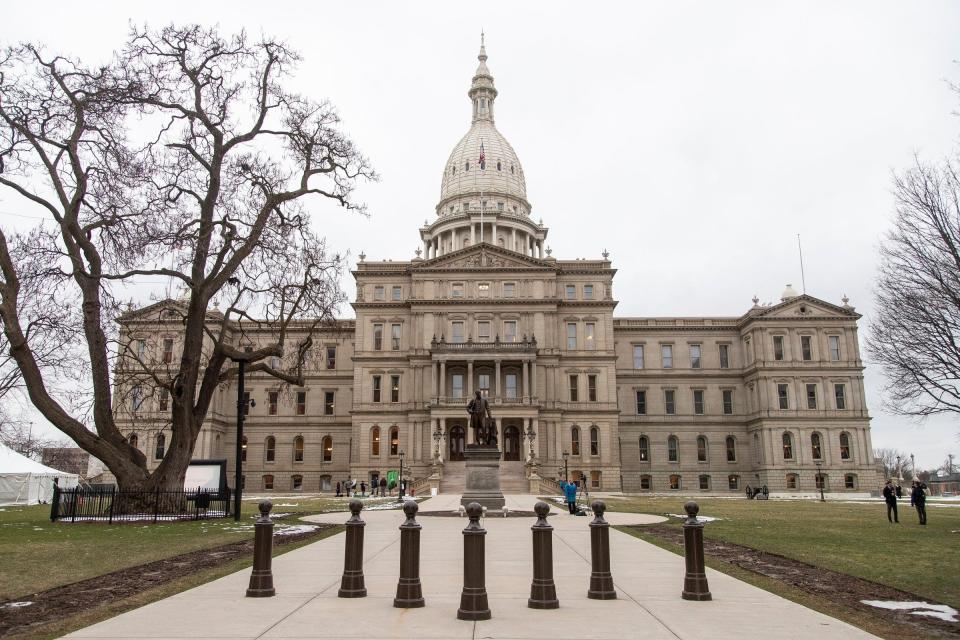

State Sen. Jeremy Moss, D-Southfield, who sponsored one of the implementation bills awaiting Whitmer's signature described his legislation as just a start after hearing calls in a legislative committee to strengthen his proposal. In response to a question from the Free Press asking why lawmakers waited until the Dec. 31 deadline approached to introduce the Proposal 1 bills, Moss defended the timing.
"If you had told the (Michigan State University) families in February that we were going to neglect them in February on moving forward on meaningful commonsense gun reforms in favor of something that we did have a deadline at the end of the year to achieve, they would have looked at us like we were crazy," he told reporters. "If we were a do-nothing Legislature, I would take that criticism. I think all of you including us are exhausted from 2023 based on the amount of work that we’ve achieved so far."
While lawmakers waited until the end of the year to take up the financial transparency legislation, Democrats went on an economic development spending spree at the beginning of the year, approving large sums to support companies promising jobs in the state in a process lawmakers have criticized for lacking transparency and aim to change next year.


"We need a very different approach to economic development," McDonald Rivet said. She's not opposed to subsidizing companies looking to expand their footprint in Michigan or move to the state. "But if that's all we do, the status quo is not going to get us out of where we are right now," she said. She wants to see greater investments in making Michigan communities attractive to lure young professionals she says want to live in walkable communities with good public transit systems where they can access affordable housing and child care.
But Democrats are bound for a slow start in the new year on any priorities that lack GOP support without the historic majority they enjoyed in the state House at the start of last year. It will take until April to fill the vacancies left by the two Democratic state representatives now serving as metro Detroit mayors.
Tate dismissed the possibility Republicans could pull off victories in the recently vacated solidly Democratic districts.
"I feel very confident that we'll be back to full strength after the special elections in our caucus," he said.
Contact Clara Hendrickson: [email protected] or 313-296-5743. Follow her on X, previously called Twitter, @clarajanehen.
This article originally appeared on Detroit Free Press: Michigan Democrats reflect on 2023 legislative session
What's Your Reaction?













